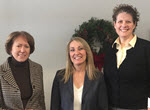Winter 2018

Our goals for this publication is to raise awareness of trending compliance issues that pertain to all employees and departments and to provide a refresher of the compliance program services and help line.
Features:
2017 Compliance Survey Results
 We would like to take this opportunity to sincerely thank all of you who completed our 2017 compliance survey. We received over 2000 responses! We greatly value your input and feedback and, as we’ve done in past years, we will use this information to tailor our program’s outreach and activities. We are pleased to note that the 2017 survey continued to show gains in both the compliance program awareness measures and the culture measures. The greatest gains were reflected in the percent of employees expressing awareness of the new Code of Conduct and Ethical Standards or “Code.” Awareness of the Code has increased among all groups of employees, including faculty, staff, graduate students and temporary employees. Overall, awareness of the Code increased nearly twenty points and is now over 90% of all respondents. With the launch of the new Code last year, the Director of Compliance, Tessa Lucey, has been promoting the Code with outreach and educational events.
We would like to take this opportunity to sincerely thank all of you who completed our 2017 compliance survey. We received over 2000 responses! We greatly value your input and feedback and, as we’ve done in past years, we will use this information to tailor our program’s outreach and activities. We are pleased to note that the 2017 survey continued to show gains in both the compliance program awareness measures and the culture measures. The greatest gains were reflected in the percent of employees expressing awareness of the new Code of Conduct and Ethical Standards or “Code.” Awareness of the Code has increased among all groups of employees, including faculty, staff, graduate students and temporary employees. Overall, awareness of the Code increased nearly twenty points and is now over 90% of all respondents. With the launch of the new Code last year, the Director of Compliance, Tessa Lucey, has been promoting the Code with outreach and educational events.
The survey also showed greater awareness of the Office of Compliance Services and knowledge regarding how to report compliance concerns. Additionally, a greater percentage of respondents indicated they felt the University fosters a “culture of compliance” and expressed confidence that as a whistleblower they would be protected from retaliation.
Still wondering what the Code is all about? Please download a copy of our user friendly Code Companion Powerpoint. This publication provides an organized overview of the Code, simplifies key elements and provides examples of real-life situations.
 If you would like Tessa to come to your unit and share her Dr. Seuss inspired Code presentation, please contact compliance@uvm.edu or call (802) 656-3086.
If you would like Tessa to come to your unit and share her Dr. Seuss inspired Code presentation, please contact compliance@uvm.edu or call (802) 656-3086.
Special thanks to this year’s survey raffle winner Jesse Mahoney of Facilities Design and Construction. Jesse won a framed limited edition print of the Ira Allen Chapel.
Policy Spotlight: NEW Telecommuting Policy
 In policy spotlight, we focus on relevant and timely policies. It is your responsibility to read and understand the policies that pertain to your job. If you don't understand something or have questions, let your manager or supervisor know. You can always contact the Office of Compliance Services for help with anything policy-related.
In policy spotlight, we focus on relevant and timely policies. It is your responsibility to read and understand the policies that pertain to your job. If you don't understand something or have questions, let your manager or supervisor know. You can always contact the Office of Compliance Services for help with anything policy-related.
There are some situations in which flexible work arrangements may be appropriate. In these situations, UVM provides these opportunities for employees, including flextime, compressed work weeks, job sharing and telecommuting. Recently, UVM adopted a new policy addressing arrangements for employees working remotely.
This new policy identifies:
- Which kinds of work may be conducive to a telecommuting arrangement and which are not,
- Manager considerations when evaluating a telecommuting request,
- Who can qualify to work remotely – the target population is high performing exempt employees that have passed any probation period,
- What approvals and documentation are necessary for telecommuting,
- How to monitor arrangements to make sure they continue to work, and
- Responsibilities of both employees and supervisors regarding the arrangement.
Telecommuting employees are required to use secure electronic devices and computer equipment with current anti-viral software as well as maintain dedicated UVM server connections for data storage. Employees are also responsible for their own safe and ergonomic work environment.
Employees with existing telecommuting arrangements should carefully review this policy with their supervisor to assess the actions that are needed to promptly bring the arrangement into compliance. The policy became effective December 5th, 2017.
For more information on the new telecommuting policy (PDF), including the request form and a sample agreement, visit the UVM Policies website.
Decisions, Decisions: How To Make the Right One When Right Isn't Always Clear
 When: Tuesday, March 13th @ 10:30am-11:30am
When: Tuesday, March 13th @ 10:30am-11:30am
How to Register: EDU@UVM - Register (opens in new window)
Every day, we all make decisions based on a variety of factors. Sometimes, the decision is clear. There is only one right answer and it's easy to make. What happens, though, when there are two or more right answers? Which one do you choose? What happens when every decision seems to be wrong? And, what happens when the obvious right answer is also the hardest? This presentation will provide you with some tools that you can use to help navigate the decision-making process.
Protecting Minors Who Participate in UVM Programs
 Over the years, the services that are designed to protect minors who participate in UVM programs have continually improved. The recent news about Dr. Larry Nassar, who was a doctor for both Michigan State Athletics and for the United States Gymnastics Team, has, once again, thrust this issue into the spotlight. What has unfolded really illustrates the grave importance of preventing, reporting and responding to potential abuse.
Over the years, the services that are designed to protect minors who participate in UVM programs have continually improved. The recent news about Dr. Larry Nassar, who was a doctor for both Michigan State Athletics and for the United States Gymnastics Team, has, once again, thrust this issue into the spotlight. What has unfolded really illustrates the grave importance of preventing, reporting and responding to potential abuse.
Protection Measures
UVM’s Protecting Minors policy(PDF) requires that all individuals having direct contact with minors in a UVM sponsored or hosted program are both trained and receive background checks prior to the start of a program. If you are thinking about sponsoring a program that involves minors, make sure to register your programs through the Department of Risk Management and Safety no later than six (6) weeks prior to the start of the program. Send an email to ProtectingMinors@uvm.edu in order to ensure adequate time for these preventative steps. Other resources to meet these obligations include:
- Forms and instructions for obtaining a background check for UVM faculty, staff, students and volunteers can be found on the HRS forms pages. Note that any criminal background check must include motor vehicle moving violations for individuals who will be transporting minors.
- Cost-free training for UVM personnel is available through the University’s liability insurance carrier. Instructions to access the training can be found on the University’s liability insurance carrier's website. Users must have a UVM email to access the training.
- Programs also require a signed parental release form. A sample parental release form (DOC) may be found in the Protecting Minors policy (PDF).
Refer to UVM’s Protection of Minors flowchart (PDF) to see what else you are required to do in the event that minors are participating in your program.
Reporting Requirements
A large portion of UVM’s employees, including all faculty, are considered UVM mandatory reporters. This means they are designated as a CSA (Campus Security Authority) or responsible employee and are legally required to report crimes or misconduct involving minors. If you are not sure whether or not you are a mandatory reporter, refer to UVM’s UOP entitled Minors; Reporting Abuse or Neglect of and Crimes (PDF) or contact UVM’s Office of Affirmative Action and Equal Employment Opportunity at (802) 656-3368.
Whether or not you are classified as a mandatory reporter, if you have knowledge of or suspect that a crime is occurring or has occurred, report it. Any immediate threat to a minor should be reported to Police by dialing 911, any other suspected conduct should be reported using the CSA reporting form.
For more information on reporting, see UVM’s Operating Procedure Minors; Reporting Abuse or Neglect of and Crimes (PDF).
An Important Message
These types of crimes are very upsetting and difficult to hear. They often have us wondering how they could have happened or how it could have gone on for so long. Know that help is always available if you have knowledge of or suspect this type of crime. Don’t ever think that this is all on you. If you witness or suspect a crime has occurred, report it. If someone discloses sexual misconduct to you, report it. It is not your responsibility to determine whether it is true or not. Unless you are part of the official investigation team, you are not the one to determine guilt or innocence. However, it IS your responsibility to let the right people know. We have a duty to EVERYONE we serve especially to those most vulnerable like minors and students. If you know about it, if you suspect it, report it.
Reporting Options:
- Report a crime
- Reporting of bias incidents, discrimination, or harassment
- Report any other type of misconduct or report a violation to a law, act, statute or UVM policy
